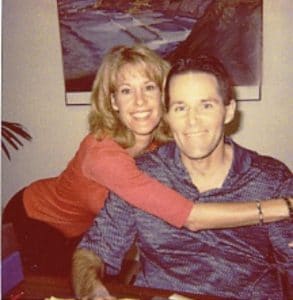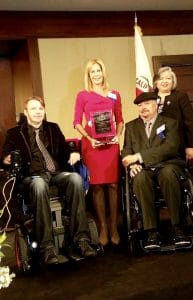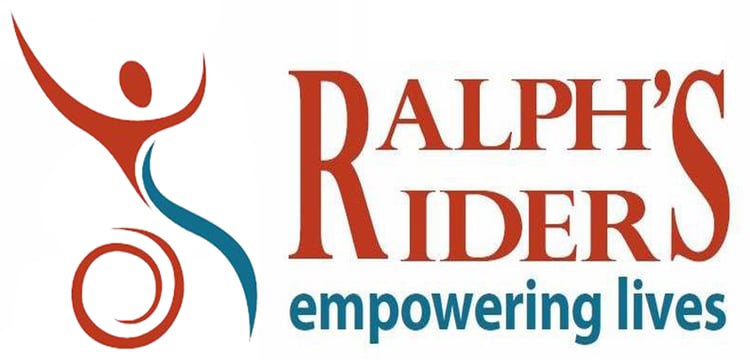Editor’s Note: Emigrating from Cuba to Southern California, the Fornos & Reyes families spent many a weekend together at the Cuban community center in Culver City. After high school, Ralph Fornos and Mayra Reyes, who had become close friends during childhood, fell out of touch until they crossed paths again at a party during their college years. Upon reconnecting, their platonic friendship quickly grew into a beautiful romance and a picture-perfect life together. At the time of their marriage, the future seemed bright; Ralph was working for an airline and finishing his political science degree, and Mayra had a promising career in fashion while also cheering for the Los Angeles Rams and working toward a degree in business administration and marketing. But after only a few months as a married couple, a surfing accident abruptly shoved them off the paths of their seemingly flawless lives. Wheel:Life writer Betsy Bailey spoke with Mayra Fornos about Ralph’s injury, how they turned tragedy into triumph, and the foundation she created to carry on Ralph’s work with fellow spinal cord injury survivors.
One day, I went to class and had a premonition while taking a calculus final. When I got home that evening, the house was completely dark which was unusual because Ralph would always leave a light on for me if he went out. When I realized he wasn’t there, I started worrying. I called my parents, my brothers, and his parents, but no one was answering. Keep in mind, there were no cell phones at the time. In my mind, I thought he had died.
me if he went out. When I realized he wasn’t there, I started worrying. I called my parents, my brothers, and his parents, but no one was answering. Keep in mind, there were no cell phones at the time. In my mind, I thought he had died.
About an hour later, a car pulled up and my whole family got out. They told me Ralph wasn’t dead but that we needed to get to the hospital right away because he had suffered a spinal cord injury while surfing.
When I got to the hospital, I learned that Ralph had suffered a spinal cord injury while surfing.
The doctor told me that what happened to him was worse than dying.
Ralph didn't realize the gravity of his situation until the doctor told him the same thing he had told me. And so the journey began.
It was the late ‘70s, and we weren't aware of any support groups for SCI survivors. This was before the American with Disabilities Act and before anything was accessible. People in wheelchairs typically stayed indoors. It was very difficult and lonely, but we had good friends, and Ralph had an amazing spirit.
When Ralph was recovering in the hospital, a guy in a wheelchair came and knocked on the door one day. It was a young stud named Greg Thompson. He was a marathon runner in a wheelchair back in the days when it was unheard of. He talked to us both for a bit and then asked for privacy to talk to Ralph alone. I remember going out into the shiny, white hospital hallway and waiting for a very long time. When I came back into the room, Ralph had the biggest smile on his face.
As Greg was wheeling out of the room and down the long, shiny, white hallway to the elevators, I thought to myself, "I just saw an angel."
 Ralph and I went through a very heavy depression after that. He would say, "You've gotta leave me, Mayra. You deserve better. I don't want to hold up your life." I was getting commercials and doing fashion shows, and he didn't want to hold me back. At night, I would evaluate things and ask myself if I'd be happier with him or without him. The scales would tip unquestionably in our favor. He was my life, my partner, my best friend, and my husband.
Ralph and I went through a very heavy depression after that. He would say, "You've gotta leave me, Mayra. You deserve better. I don't want to hold up your life." I was getting commercials and doing fashion shows, and he didn't want to hold me back. At night, I would evaluate things and ask myself if I'd be happier with him or without him. The scales would tip unquestionably in our favor. He was my life, my partner, my best friend, and my husband.
Eventually, Ralph came out of his depression, and I believe what Greg Thompson said to him that day in the hospital helped him immensely. He held that moment with him and kept going back to his words during dark times.
We struggled to find our way, but things started to turn around for us. Ralph finished his political science degree at the University of Southern California despite being in a wheelchair, which was an amazing accomplishment for that time. His dream had always been to become a lawyer, but he had lost confidence after his injury; he didn't think he could do it in a wheelchair. Slowly, I talked him into going to law school.
The University of Southern California was too inaccessible. Then, he heard about a small school called the University of West Los Angeles School of Law. The president of the school was a retired appellate judge named Justice Bernard Jefferson. He was a Harvard Law School graduate and wrote the California Evidence Benchbook which is still in use today. When Ralph met with him, he decided he wanted to be part of making law school accessible to everyone. He even made arrangements for Ralph to have a part-time schedule so it would be doable for him.
Somewhere down the line, Ralph convinced me to come and sit in one of his classes.
He encouraged me to become a lawyer with him so we could change the world for the disabled together.
I didn't think I was disciplined enough, but after attending some classes, I fell in love with the fact that one person can have a lot of impact on the world. We ended up graduating and passing the bar at the same time.
 We opened a small law office together, and before we knew it, we had people coming from all over the state. Even before the internet, people had heard about “the gimp lawyer and his caregiver wife, who happens to be a lawyer, too.” Ralph would laugh about that because he had a great sense of humor. We were so inexperienced at the time that we would tell people we couldn’t help them with the massive cases, but they didn't care. They trusted us and felt comfortable with us. So, we started bringing in the top trial lawyers in the state to help us with the cases. We learned so much from them.
We opened a small law office together, and before we knew it, we had people coming from all over the state. Even before the internet, people had heard about “the gimp lawyer and his caregiver wife, who happens to be a lawyer, too.” Ralph would laugh about that because he had a great sense of humor. We were so inexperienced at the time that we would tell people we couldn’t help them with the massive cases, but they didn't care. They trusted us and felt comfortable with us. So, we started bringing in the top trial lawyers in the state to help us with the cases. We learned so much from them.
Editor’s Note: Fornos Law Firm customizes the best legal team for each specific case. The firm has been selected for the inclusion in “US News & World Report Best Law Firms” in the areas of personal injury and other catastrophic injuries. For several years, Mayra has been listed in “Best Lawyers in America” and has been recognized as one of Southern California’s “Super Lawyers” as well as one of the Top 50 Women Attorneys in Southern California by Los Angeles Magazine as published in February 2018. In addition, Mayra has been listed in Los Angeles Magazine as one of “Los Angeles Women Leaders In The Law.” Mayra has been involved with the SCI community for over twenty-seven years.
After practicing law together for 13 years, Ralph passed away in 2002 due to an illness unrelated to his spinal cord injury.
He was my everything, and after he died, I went through a very deep depression.
It took me a long time to function again. I wasn't taking any cases, and I couldn't concentrate or think straight. Eventually, I had to get back to work because I had gone into debt. Slowly, the practice started growing again.

Ralph had been an active peer mentor. Sometimes, people would call in the middle of the night, and he would talk to them for hours giving them advice and hope. He'd tell them how he went to law school, and how they could pursue their goals, too. I felt strongly about staying involved in the disability community and continuing what Ralph was doing with peer mentoring. I wanted to carry that on in his memory.
I reached out to a couple of Ralph's friends who are also in wheelchairs, and we held a meeting to talk about launching a foundation. We decided on the name Ralph’s Riders and started holding regular meetings and fundraisers. Once we were able to raise some money, we began providing small grants for people who needed financial help with things like home ramps or vehicle hand controls. We also put in place a peer mentoring program.

It has now been 10 years since we first held that meeting and launched the Ralph’s Riders Foundation. We have been able to provide many people who have suffered SCIs, TBIs, or other catastrophic injuries, with grants, peer support, and various resources.
While he was an attorney, Ralph also helped change laws for the disabled. He formed a committee called the Disability Advisory Committee in Culver City with another disabled individual named John Troost, who is now an LA County Commissioner. The committee would go to the city council and discuss what was needed in the community such as an accessible library or curb cuts.
The city began listening to them even before the ADA was enacted.
When Ralph passed away, I was asked to step into his spot to finish his term. I'm still part of the committee today. Culver City is now partners with Ralph’s Riders and provides us with a place to hold our board meetings. Culver City is one of the most progressive cities in opening access and breaking down barriers. They've been amazing and very supportive.
Editor’s Note: The Los Angeles County Board of Supervisors and Los Angeles County Commission on Disability selected the Ralph's Riders Foundation and Fornos Law Firm for the prestigious “Chairperson’s Award by the Los Angeles County Commission on Disabilities” for all their work in the community. The Ralph Rider’s Foundation also received the Ed Roberts Independent Living Award by the Dayle McIntosh Center in 2010.
Recently, Ralph’s Riders launched educational and resource days where we hold an orientation for people to learn about what's available to them and what they can do if they’ve experienced catastrophic injury or illness. We want to build awareness and inform people who have suffered an SCI, TBI, or other catastrophic injury or illness due to someone else’s negligence or wrongdoing what their legal rights are and that there is a time limit to take action on their case. We have teamed up with AbleThrive who, along with our Riders, presents the resource aspect and talks about topics such as how to adapt after being injured and finding a peer mentor. I teach the law portion to help people understand their legal rights.
Many people don’t take legal action because they’re afraid of the costs, but what they don’t know is that they don’t have to pay for an attorney.

Winning a lawsuit won't heal someone, but it can make their life easier. It could allow them to buy an accessible home, pay for medical costs, or purchase a van, for example. In addition to assuring that our clients get their medical and out-of-pocket expenses covered in order to live more independent and productive lives after an injury, we also push to change business policies and procedures to ensure compliance with ADA laws.
Our first two educational and resource days were held at Rancho Los Amigos Hospital. We’re hoping to expand to other areas and facilities as well.
Some ways people can get involved with Ralph’s Riders is to donate, become a sponsor, or sign up as a peer mentor. We also welcome opportunities to work with other nonprofits. These types of partnerships not only help Ralph’s Riders grow, but they also benefit the other parties as well by bringing awareness to each of our missions and providing support at each other’s events and networking opportunities. Our Ralph’s Riders Alliance consists of an awesome group of businesses and nonprofits that are doing great things to impact this disability community.
Together, we can build and create an empowering community.

Editor’s Note: For more information on Ralph’s Riders, visit their website at RalphsRiders.org and follow them on Facebook @ralphsridersfoundation.
If you've suffered a catastrophic injury or illness in the state of California and are seeking legal advice, visit FornosLaw.com.
All information contained in this article was extracted from an interview with Mayra Fornos, the Ralph's Riders website, or provided by Margarita Elizondo, Director of Media Strategy & Community Outreach at Fornos Law.
Betsy Bailey has a diverse background including experience in marketing research at American Express, business operations and client relations with 601am, travel and culinary writing with VegDining, and playing volleyball professionally overseas.
Betsy has been writing for Wheel:Life since January of 2017 and thoroughly enjoys the process of getting to know her interviewees. She also teaches students learning English as a second language, speaks French fluently, and travels any chance she gets!